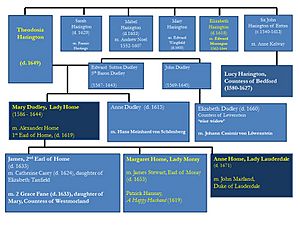Elizabeth Dudley, Countess of Löwenstein facts for kids
Quick facts for kids Elizabeth Dudley |
|
|---|---|
| Countess of Löwenstein | |
| Spouse(s) | Johann Kasimir, Count of Löwenstein-Scharffeneck |
| Father | John Dudley |
| Mother | Elizabeth Whorwood |
| Died | 1662 London, England |
| Occupation | Lady-in-Waiting to Elizabeth Stuart, Queen of Bohemia |
Elizabeth Dudley, Countess of Löwenstein (who lived from about 1613 to 1662), was an important lady at court. She served as a Maid of Honour and later a lady-in-waiting to Elizabeth Stuart, Queen of Bohemia. Elizabeth Stuart was the daughter of King James VI and I of Scotland and England.
Contents
Who Was Elizabeth Dudley?
Her Family and Early Life
Elizabeth Dudley was likely the daughter of John Dudley (1569-1645) and Elizabeth Whorwood. The Dudley name was used by the Sutton family. Elizabeth Dudley's aunt, Theodosia Harington, said that Elizabeth was her niece. Theodosia's daughter, Anne (Dudley) Sutton, also worked for Princess Elizabeth. This family connection probably helped Elizabeth Dudley join the royal household.
In April 1613, Elizabeth Dudley was listed among the people traveling to Heidelberg Castle in Germany. She arrived in Vlissingen, Netherlands, on April 29, 1613. Other ladies with her included the Countess of Arundel and Lady Harington.
Her Role as a Lady-in-Waiting
Elizabeth Dudley was a close companion to Elizabeth Stuart, Queen of Bohemia. Ladies-in-waiting were important helpers and friends to queens and princesses. They assisted with daily tasks, attended social events, and often became trusted confidantes.
Life as a Countess and Widow
Marriage and Loss
In 1622, Elizabeth Dudley married Johann Kasimir, Count of Löwenstein-Scharffeneck. Sadly, he died later that same year. Johann Kasimir had attended the funeral of Prince Henry in 1612. He drowned in the River Main during the Battle of Höchst in June 1620, along with many soldiers.
The Queen's "Wise Widow"
After her husband's death, Queen Elizabeth of Bohemia often called Elizabeth Dudley her "Wise Widow." She also used nicknames like "Dutch Bess Dudly" and "my reverend Countess." These names show how close they were and how much the queen valued her.
Adventures and Jokes
Elizabeth Dudley was known for her sense of humor. In 1625, she went on a trip through North Holland with Queen Elizabeth and Amalia van Solms. During this trip, she was involved in several funny situations.
One story from 1637 tells how Elizabeth Dudley playfully "boxed the ears" of Elisabeth of the Palatinate in a garden. This was likely a joke, showing her lively personality. Another funny story, written in French, described her as an "ambassador" for the Queen. The humor came from her love of food, funny faces, and occasional use of German words.
Traveling for the Palatinate Cause
Journey to England
The Countess traveled to England to gather support and money for the Palatinate cause. The Palatinate was a region in Germany that Queen Elizabeth's husband, Frederick V, had ruled. They needed help after losing their lands in a war.
In April 1631, she sailed on the ship Convertine with Lord and Lady Strange. They traveled to the Brill Road in the Netherlands.
Return to The Hague
In 1639, after staying in London, she returned to The Hague. She wrote to Constantijn Huygens, a famous Dutch poet and diplomat. She joked that he was a "witch" and mentioned that Lady Stafford was sending a musical instrument called a theorbo.
She also wrote about the difficult situation in England: "In England there is nothing spoken of but the troublesome war which is like to be with Scotland, and without the great mercie of God it will be the ruin of both the kingdoms." This shows she was aware of the political problems leading to the English Civil War.
Friendships and Later Life
Elizabeth Dudley kept up her playful "witch" jokes with Huygens in their letters. She also had a friendship with Sir Ferdinando Knightly, an English soldier. In 1644, Huygens joked that Knightly's promotion would make the "widowed countess's white marble into warm wax." This was a playful way of saying it might make her happy.
She also wrote to Lady Frances Broughton, another former lady-in-waiting, and her husband. She shared news about their son and assured them that Queen Elizabeth "will never doubt the affection of the worthy Welsh men for she knows they are honest and Brave Men."
When Queen Elizabeth of Bohemia died in London in 1662, Elizabeth Dudley helped sort out the queen's belongings. She made sure some jewels and goods were kept to cover money she had lent the queen over the years. She then returned to The Hague.
Images for kids
 | William M. Jackson |
 | Juan E. Gilbert |
 | Neil deGrasse Tyson |



